Why the era of Eddie McGuire may never be the same
Some who know him best say Eddie McGuire is destined to stage a comeback. But there’s no doubt the goalposts have shifted. So could Eddie really be gone for good?
News
Don't miss out on the headlines from News. Followed categories will be added to My News.
It was some time late last year, after Eddie McGuire’s mum Bridie had passed away but before McGuire announced that he would no longer be on Triple M in the mornings.
Neil Mitchell, from 3AW, had just received another on-air jab from McGuire.
The pair, like boxers in the 23rd round, have long disagreed in public, more out of theatre than actual rage, but largely because Mitchell has never accepted McGuire’s conflicted interests.
Mitchell had just been called an “irrelevant old windbag”. He felt McGuire had been more vitriolic, and less constructive, in his criticisms of late.
All veteran on-air talents, including Mitchell, have committed moments of on-air madness they wished they could do over.
Fatigue is the enemy, and no one works harder than McGuire, who has proudly started and ended the day in the dark since his school days.
So Mitchell sent McGuire a text message: “Give yourself a break. You get into trouble when you are tired.”
McGuire, looking tired, got his long overdue break when he resigned from the Collingwood presidency this week. It felt like the end, not just for a football president, but a pervasive slice of Melbourne heritage.
The world, naturally, analysed what McGuire did, did not and should have said. He was either a relic, or a tall poppy torn down, and the masses duly filled the opposing trenches of the Eddie battlelines.
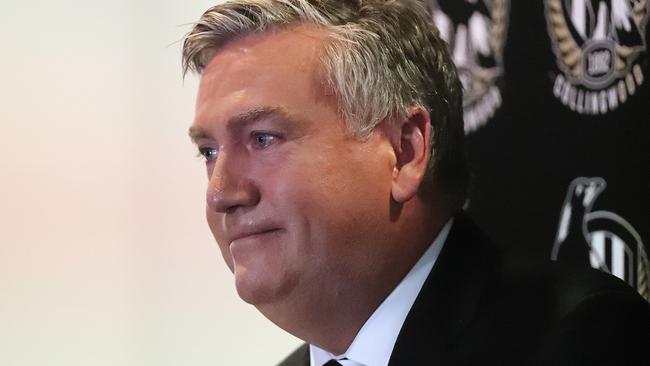
This was not another blip that could be dimmed with a show of remorse. The enemies leapt to their keyboards as if they had been waiting to pounce.
McGuire was being personally slapped with tags of “racism”. Someone tweeted that the episode was a “disgustingly perfect vignette of white supremacy”.
Mitchell cites McGuire’s “shocker” press conference from last week, as many do, as the moment.
McGuire was responding to the club’s leaked Do Better report, which spoke of “cultural safety” and individuals (McGuire?) who wielded unhealthy influence at Collingwood.
McGuire sat with three others in a sponsors-free room.
The Collingwood brass looked increasingly uncomfortable with McGuire’s patter of a “historic and proud day” when the subject matter was hate and failings.
McGuire wasn’t here to apologise; he declined to say the word out loud, as if he knew to do so would steer the headlines. McGuire wanted to throw forward, not back.
His misfire felt different from the times he has erred in the past, when impetuosity or fatigue might explain his poorer judgments.
McGuire wasn’t committing a surprise gaffe. He wasn’t flushed with anger. He had wet his finger, checked the wind, and misread the direction.
He was soon isolated within his own club. Players released their own thoughts about the report, at odds with McGuire’s spin of inflated optimism. Eddie and Collingwood were no longer interchangeable.
McGuire had already announced that he would stand down at year’s end as president. But there was a groundswell. It wasn’t enough. He would have to stand down now.
The end was not the goodbye of a devoted clubman, dripping with platitudes and gratitude. Accusations, unchecked in the wilds of social media, flowed readily, as if a release valve had been opened.

McGuire hadn’t just erred, a line went. He must learn from his failings, then educate others who have been just as blind to their shortcomings.
The constancy of 23 years as a club president and media titan – what Mitchell calls the irreconcilable roles of “both player and observer” – was over. McGuire, the irrepressible, unstoppable force of nature, had kicked an own goal.
Since the late 1990s, McGuire has served as a kind of unelected politician, at times a figure almost as polarising as Pauline Hanson.
Host of the highest rating TV show in his 30s, he rallied for a republic in his spare moments. He smudged the traditional boundaries of politics and sport like no one before him.
Melbourne may be a thriving metropolis, but it can also be confused for a village of a few million people.
Real power is mostly hidden, wielded by few and dispensed with a nod or a whisper. McGuire has long been in the club, on first name terms with leaders he called Jeff, Steve and Dan.
As McGuire’s stature grew, so did the mountain he sought to climb.
He was an updated model of Ron Walker, or Lou Richards, at whose funerals McGuire gave eulogies. He was like both of them and neither of them.
McGuire has made things happen, like Walker, and boasted the common touch, like Richards. McGuire has been a kind of glue that welded once disparate if related segments of Melbourne culture.
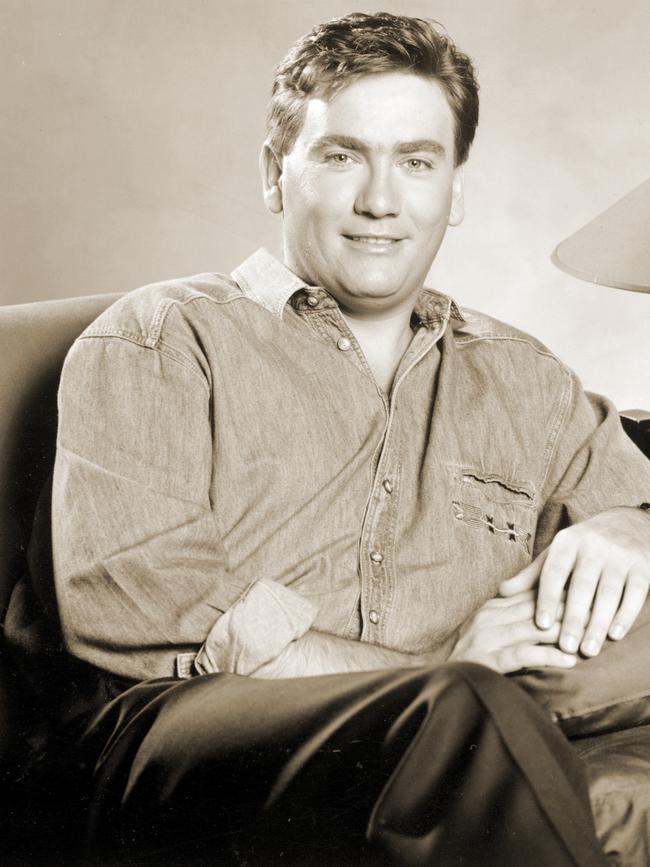
Now Mr Melbourne was relinquishing the crown. The tribe had spoken (perhaps along with a one or two wobbly Collingwood sponsors).
The subtext was that McGuire did not want to resign. But he wanted his club to be distraction free; in effect, that he was taking the hit for the team.
The fall shared elements with a Sydney fixture, Alan Jones, who said as he pleased for decades before campaigners claimed credit for toppling him from his radio perch. Not that McGuire would concede to the knockers.
His final press conference as club president defied the norms of a football administration departure.
It bumped a COVID outbreak as the big headline. Besides Jeff Kennett, who can even name any other football club president?
Eddie’s departure felt like the farewells of Prime Minister Kevin Rudd and Julia Gillard after they took turns knifing one another. Watery eyes. Cracking voice.
He expressed pride in the legacy, indeed exuded a need to extol it. But there was also a defiance, perhaps a shade of victimhood.
“When I came to Collingwood, it was a club riven with rivalries, enemies and division,” he said.
“It has not been the case in my time. So I do not want any of this to cause rancour or factions.”
He was sorry to the club and the community. His club was not racist.
“It is why I’m so proud of our club and the people every day and every week who benefit and who are inspired by the very purpose of the being of Collingwood, and that is to be a beacon of hope for all people, particularly those at their lowest ebb or who have been socially isolated and left behind,” he said.
But who did he think were the victims here? Did he, as it seemed, think he was among them?
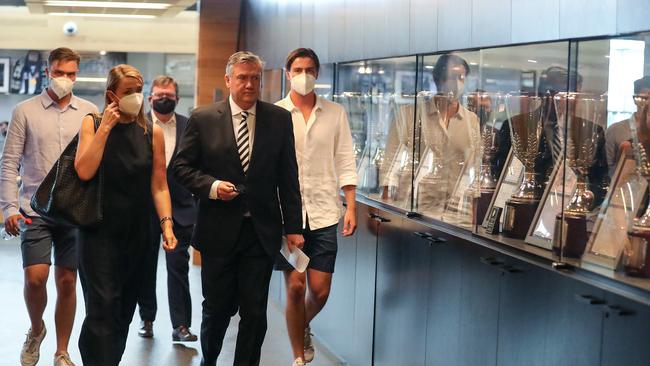
McGuire has made plenty of public mistakes. For years he just seemed to move on, unabashed, even after the NSW Parliament voted that he was a “continual boofhead”.
He called his first line at last week’s press conference a “lightning rod for vitriol”.
McGuire has worn a big target for criticism for decades. But this was more than that. To say his name at the doctor’s surgery this week, or at a Crown function, was to invite a decidedly anti-Eddie response.
He had tried to spin the story – from bad to good – in ways that defied credibility. He was exposed not only for getting it wrong, but for just not getting it.
Collingwood is a historically low base for racism. Nicky Winmar’s raising of his jumper at Victoria Park in 1993 was a defining moment.
Then president Allan McAlister’s response – “as long as they conduct themselves like white people” – skewed the debate.
That Collingwood president wasn’t the future, but the past. He wasn’t the fix, but the problem.
When McGuire made a clumsy joke about Adam Goodes on radio, he apologised the same afternoon. When a young spectator racially taunted Goodes on the field, McGuire went to the Swans change-rooms immediately afterwards.
He’s the bloke, if you believe a close friend, who pulls up any acquaintance for the most accidental or casual form of spoken racism. He won’t tolerate it, even in the lightest of contexts.
Dermott Brereton says that McGuire’s strength is also his weakness. McGuire’s belief in moving past crisis, and in throwing the “shield of steel” around Collingwood, failed him on this occasion.
Another friend identifies an organisational failure. He says the club was caught out badly by the Herald Sun story of the Do Better report. McGuire tried to steer the club out of a mess but he chose unwisely, under pressure not of his own making, and was scapegoated as an emblem of inactivity.
For the so-called litany of gaffes, Brereton reckons that McGuire regrets about four sentences from the millions of words he has uttered in public.
He argues that no has done more for the betterment of the game than McGuire. He has represented a new age of enlightenment, not just for Collingwood, but the greater league and its fans.
“It breaks his heart, and people have no understanding of how it breaks his heart,” a friend said.
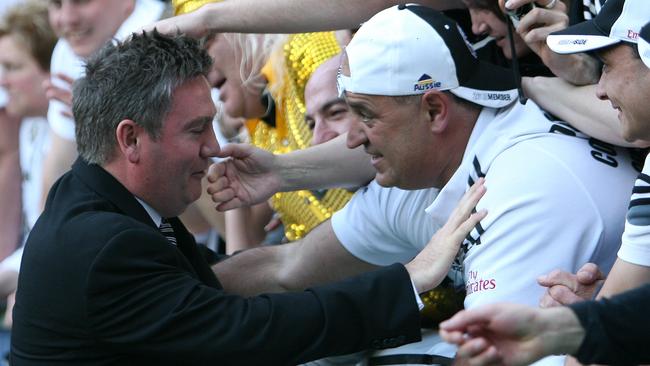
“It’s the opposite of what he believes in. This is why it cuts him so much, because in terms of the fibre of the guy it is everything that he is not, has never been, and that he detests.”
If McGuire is hurting this week, he has been assured by the support of his closest friends and allies. Those who know McGuire well do not think McGuire to be racist.
But the world has shifted. The entertainer and broadcaster Ernie Sigley used to say that you had to have 51 per cent of the people love you. Get them, and the rest didn’t matter.
It doesn’t work like this anymore.
Armies of keyboard warriors are poised to jump on the slightest misstep. They identified shame, for what McGuire had done, and what he had not done.
Father Bob Maguire was smacked down for supporting McGuire. Even the careful comments of Premier Dan Andrews – that McGuire need not quit the Collingwood presidency – generated their own echo chambers.
It ends what Saturday Herald Sun columnist Steve Price describes as McGuire’s “annus horribilis”.
McGuire has always drawn on the touchstones of his parents. His father Edward, who worked down the mines as a kid, died in 2011.
His mother Bridie, was raised in the hardships of rural Ireland. Humble folk, the McGuires instilled values of excellence and education in their four children.
On her death last August, McGuire said he did not seek any personal sympathy in his tough times.
But he hurt deeply. In her final months, McGuire spent so much time at his mother’s nursing home that his friends thought of him as her primary carer.
His year accumulated woes. His push for harsh COVID controls for AFL players got labelled hypocritical when a Collingwood player breached the guidelines.
His conflicting hats of broadcaster, AFL representative and club administrator fanned long-held notions that his roles were compromised by his abiding loyalty to the Collingwood cause.
The post-season trade choices of Collingwood raised ire. Good players felt rejected by a club where togetherness is prized. The brutal cuts were largely condemned by Collingwood’s supporters.
The festering sore was racism. It’s an ugly tag, hard to shake, and former player Heritier Lumumba was plainly chipped by events during a long career at the club. He launched court action, citing racial abuse, against Collingwood and the AFL last October.
Price argues that McGuire’s biggest error lay not in his response to the “Do Better” report, but the decision last July to commission co-authors who were bound to find fault – the kind of fault that cannot be allayed with spin.
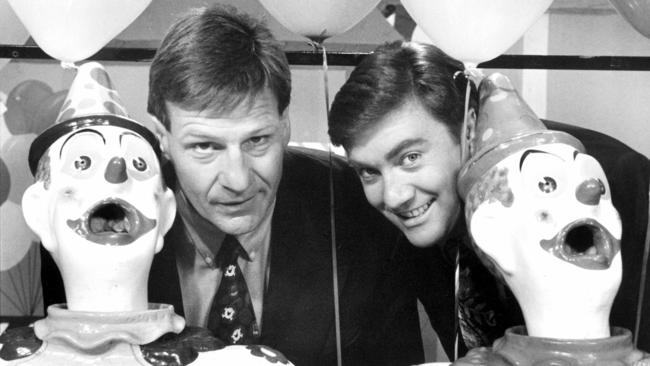
By year’s end, McGuire was talking “reassessment”. His mother had passed away; his son had completed VCE. He sought more time with family. He spoke of reducing work hours, being more targeted in what he did. As a friend puts it, he wanted to “decrease the (Eddie) bandwidth a bit”.
There are two Eddies. This is how a former Collingwood bigwig sees it. His take might be the neatest way to make sense of McGuire.
There’s the charmer, as displayed in public. He’s as comfortable with people in the boardroom as in the street.
An extraordinary memory drives his flattery. He remembers this or that detail, like a good politician. Always busy, he always has a moment for you, and he makes you feel like you matter.
Then there’s the hothead, at the whim of his temper, who will scream and shout and go red in the face.
Neil Mitchell says McGuire’s adherents bow to the “wrong Eddie”, the smooth talker with the everyman touch.
Mitchell prefers the Eddie who mostly goes unsighted, the version that the Salvation Army’s Brendan Nottle calls the best kind.
Nottle went to McGuire about a decade ago with a plan for the club to house homeless people. The Magpie Nest is now 50 houses and homes 140 people.
Nottle, mindful of costs, suggested they furnish the accommodation with second hand furniture.
Can’t do it, McGuire replied. The residents must feel more valued than that.
They got new furniture.
At last year’s annual Christmas get together, McGuire brought his family to a Salvos laneway meal.
McGuire noticed a street man with a guitar. The pair sang and laughed together in the gutter.
McGuire’s care is not put on, says Nottle, who is well-versed in the difference between corporate promise and delivery.
“He has that rare gift of seeing a problem and, in his own mind, seeing the solution,” Nottle says.
“And he delivers on it.”
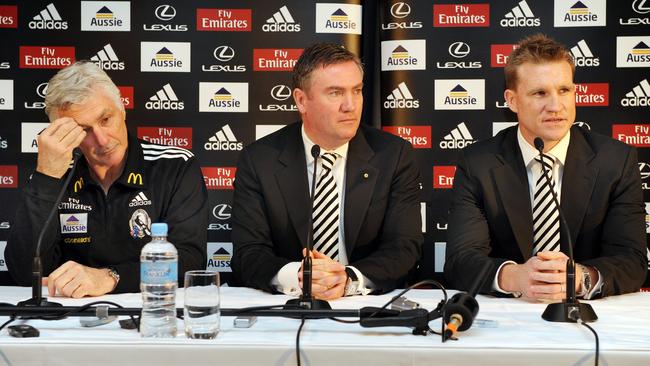
A friend of McGuire cites the National Indigenous Radio Service (NRIS). It was ailing, until McGuire brokered partnerships with a university.
“Without Ed, there wouldn’t be a NIRS,” he says.
Price says McGuire is an unusual combination of thin and thick skin. McGuire does not like other journalists criticising him. He has bristled at the mildest of knocks.
It’s said McGuire believes there is an underbelly of football journalists who resent his bigger success.
Going back, he has felt unfairly derided as a misplaced upstart from Broadmeadows.
Price puts McGuire among the top five Melburnians that Sydney talks about.
Yet McGuire’s experience in that city, when he moved to take over as Channel 9 chief executive in 2006, seems to underline his uniqueness to Melbourne.
McGuire was slighted as an interloper in Sydney. The claims of his “boning” Jessica Rowe sealed a short period when McGuire could not win over the powers who mattered.
”If they don’t like you, they’ll try everything they can to make sure you don’t work,” Price says.
Twenty years ago, McGuire met a young journalist for the first time.
McGuire happily confessed to hiring a sports car to impress a prospective boss at Channel 9. And yes, at age nine he sold his parents’ lounge suite to the neighbours’ for $10, and threw in delivery on his billycart – for an extra fee.
He was flying then, years into the Footy Show marathon, and recently appointed president of the club he had adored from age five.
He didn’t hide that he was on the make. Naked ambition was no curse, nor the attending perception of vanity.
He didn’t mind that a football journalist said McGuire thought he was JFK and “born to rule”.
There was folksy wisdom in his thinking. McGuire nodded to a speech of Ted Roosevelt, who went on to be US president.
In what came to be known as the The Man In The Arena speech, Roosevelt said: “It is not the critic who counts; not the man who points out how the strong man stumbles, or where the doer of deeds could have done them better. The credit belongs to the man who is actually in the arena.”
Last Tuesday, McGuire reluctantly left the arena.
According to some who know him best, McGuire is destined to return. It may be next week or next month. It’s just in his nature.
“As he said, he won’t ever stop trying,” said a friend.
“And he won’t stop trying.”
Yet the goalposts have shifted. The players he once counted on his side, such as social justice reformers, will keep hacking at his preferred legacy.
The era of Eddie may never be the same.
More Coverage
Originally published as Why the era of Eddie McGuire may never be the same





